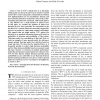Free Online Productivity Tools
i2Speak
i2Symbol
i2OCR
iTex2Img
iWeb2Print
iWeb2Shot
i2Type
iPdf2Split
iPdf2Merge
i2Bopomofo
i2Arabic
i2Style
i2Image
i2PDF
iLatex2Rtf
Sci2ools
106
Voted
INFOCOM
2005
IEEE
2005
IEEE
Bayesian packet loss detection for TCP
— One of TCP’s critical tasks is to determine which packets are lost in the network, as a basis for control actions (flow control and packet retransmission). Modern TCP implementations use two mechanisms: timeout, and fast retransmit. Detection via timeout is necessarily a timeconsuming operation; fast retransmit, while much quicker, is only effective for a small fraction of packet losses. In this paper we consider the problem of packet loss detection in TCP more generally. We concentrate on the fact that TCP’s control actions are necessarily triggered by inference of packet loss, rather than conclusive knowledge. This suggests that one might analyze TCP’s packet loss detection in a standard inferencing framework based on probability of detection and probability of false alarm. This paper makes two contributions to that end: First, we study an example of more general packet loss inference, namely optimal Bayesian packet loss detection based on round trip time. We show that for...
Related Content
| Added | 25 Jun 2010 |
| Updated | 25 Jun 2010 |
| Type | Conference |
| Year | 2005 |
| Where | INFOCOM |
| Authors | Nahur Fonseca, Mark Crovella |
Comments (0)

